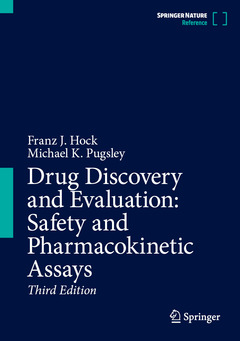Drug Discovery and Evaluation: Safety and Pharmacokinetic Assays (3rd Ed., 3rd ed. 2024)
Coordonnateurs : Hock Franz J., Pugsley Michael K.

-A landmark in the continuously changing world of drugs
-Essential reading for scientists and managers in the pharmaceutical industry involved in drug finding, drug development and decision making in the development process
-Of use for government institutions and committees working on official guidelines for drug evaluation worldwide
Part 1: Safety Pharmacology.- Safety Pharmacology – Introduction. Status of Safety Pharmacology and Present Guidelines. Central Nervous System (CNS): Safety Pharmacology Studies. In vitro Methods in Cardiovascular Safety Pharmacology. In vivo Methods in Cardiovascular Safety Pharmacology. Renal System in Safety Pharmacology. Liver System in Safety Pharmacology. Respiratory System in Safety Pharmacology. Safety Pharmacology in Metabolism Pharmacology (incl. Gastroenterology, Antidiabetic Activity, Antiobesity, Antiarteriosclerotic Activity). Peripheral Nervous System. Safety of Intravenous and Inhalation Anesthetics. Drug Addiction and Drug Dependency. Side Effects of Central Analgesic Drugs. Ocular Safety Tests. Auditory System in Safety Pharmacology. Safety Pharmacology and Sleep Disorders, Sleep Apnea. Safety Pharmacology and Tinnitus. Blood Constituents and Safety Pharmacology. Endocrine Pharmacology. Skin Pharmacology. Oncology Pharmacology. Immunology and Safety Pharmacology. Safety Pharmacology Assessment of Biopharmaceuticals. Knock-out Animals in Safety Pharmacology. Organ Chips in Safety Pharmacology. Safety Pharmacology Testing in Juvenile Animals. Transgenic Animals. Stem Cells a) CNS b) Cardiovascular. Safety Pharmacology of Vaccines. Biomaterials in Their Role in creating New Approaches for the Delivery of Drugs, Proteins, Nucleic Acids and Mammalian Cells. Magnetic Resonance Imaging in Safety Pharmacology. Nanotechnology and Safety Pharmacology. Zebrafish in Drug Discovery: Safety Assessment. Chronobiology and the Implication for Safety Pharmacology. Translation and Validation of Safety Pharmacology Studies. Disease Models in Safety Pharmacology. Personalized Medicine and Safety Pharmacology. New Biological Entities and New Modalities. Drug Safety on Herbal Medical Products. Study Design, Species Selection and Statistics. AI in Drug Development.- Part 2: Safety Pharmacokinetics.- Safety Pharmacokinetics – Introduction. Absorption: In vitro Tests – Cell Based. Absorption: in vitro Tests – Non Cell Based. Absorption: In vivo Tests (Radiolabeled). Bioanalytical Assays: Gas Chromatography (GC). Bioanalytical Assays: LC-MS/MS. Bioanalytical Assays: RIA/EIA. Bioanalytical Assays: Toxicokinetics. Distribution – In vitro Test: Protein Binding. Distribution – In vivo Test: Perfused Organ. Distribution: Across Barriers. Distribution In vivo. Distribution In vivo: Other Methods. Drug-Drug Interactions: Enzyme Induction. Drug-Drug Interaction: Enzyme Inhibition. In Silico ADME Modeling. Metabolism Studies In vitro and In vivo. Pharmacogenomics in Drug Metabolism Enzymes and Transporters. Physicochemical Properties. Clinical Pharmacokinetic Studies. Population Pharmacokinetics. Typical PK/PD Approaches in Preclinical and Clinical Development.- Part 3 Safety Toxicology.- Safety Toxicology – Introduction. Dose Range Finding (DRF) Studies. Maximum Tolerated Dose (MTD) Studies. NOEL Studies. Sub-chronic and chronic Toxicology. Special Toxicology – Bone. In vitro Toxicology. Juvenile Toxicology. In Silico Toxicology. Gentoxicology. Reproductive Toxicology. Miniature Swine Specifically Studies. Repeat-Dose Dermal Irritation and Dermal Toxicology. Phototoxicity. Ototoxicity. Target Animal Safety (TAS) Studies. Computational Toxicology. OMICS Technologies. Testing of Medical Devices. Safety Chemical/REACH. Species Selection for Pharmaceutical Toxicity Studies. International Guidelines. AI for Drug Toxicity and Safety.
Franz Jakob Hock received his Ph.D. degree (Sc.D.) in Zoology at the Institute of Neuroethology and Biocybernetics at the University of Kassel, Germany. He joined the Department of Pharmacology of the pharmaceutical company Hoechst AG in 1976. He initially worked on methods in general pharmacology and nephrology, before becoming head of a laboratory devoted to pharmacological methods for drugs influencing memory and learning. He was then appointed Head of the Laboratory of General and Safety Pharmacology at the Frankfurt site of Aventis Pharma Deutschland GmbH. He received the degree of Fachpharmakologe DGPT (“certified expert pharmacology”) in 1981. In 1983 he spent a sabbatical year at the University of California, Irvine, at the Center for the Neurobiology of Learning and Memory (Director Prof. Dr. James L. McGaugh). He lectured for several years to students in Biology at the University of Kassel and the Technical University Darmstadt. He has published over 100 original papers on methods in Pharmacology and on new compounds. He is currently a member of the Task Force General/Safety Pharmacology German/Swiss Pharmaceutical Companies. He served several times as a member of the program committee of the Safety Pharmacology Society. He is a member of several domestic and international scientific societies. He now works as a consultant in pharmaceutical business development.
Michael K Pugsley is the Senior Director of Toxicology & Safety Pharmacology at Cytokinetics Inc., where he currently designs, manages, interprets, and reports the findings from all non-clinical IND- and NDA-enabling toxicology studies for therapeutic areas including Heart Failure and Amyotrophic Lateral Sclerosis (ALS). Additionally, he leads the in-house conduct of all non-GLP toxicology studies for several discovery biology programs. He also provides high-level expertise to project and program teams and senior management, including evaluation of study conclusions an
A landmark in the continuously changing world of drugs
Essential reading for scientists and managers involved in drug finding, drug development and decision making
Of use for government institutions and committees working on official guidelines for drug evaluation worldwide
Date de parution : 09-2024
Ouvrage de 2100 p.
17.8x25.4 cm



